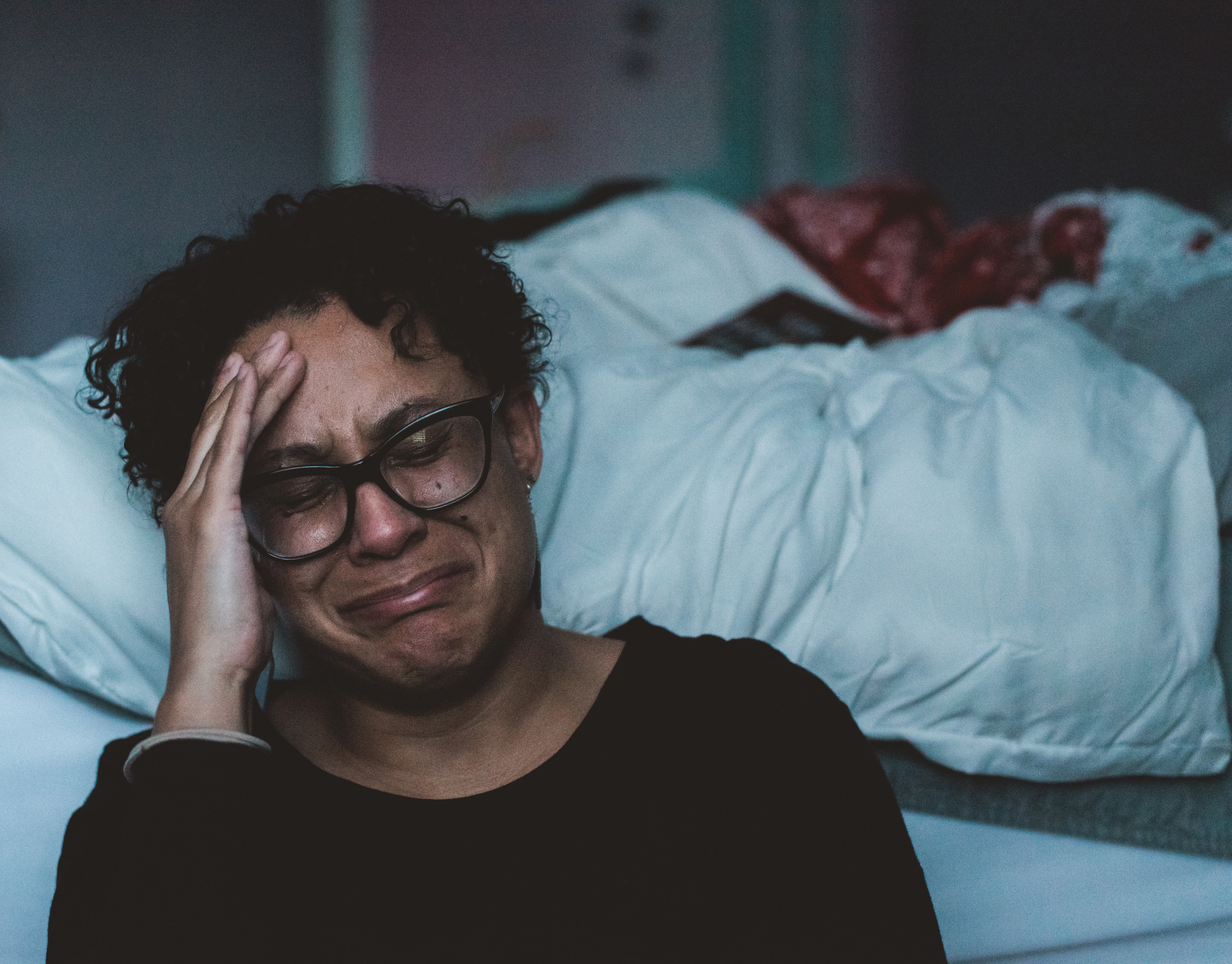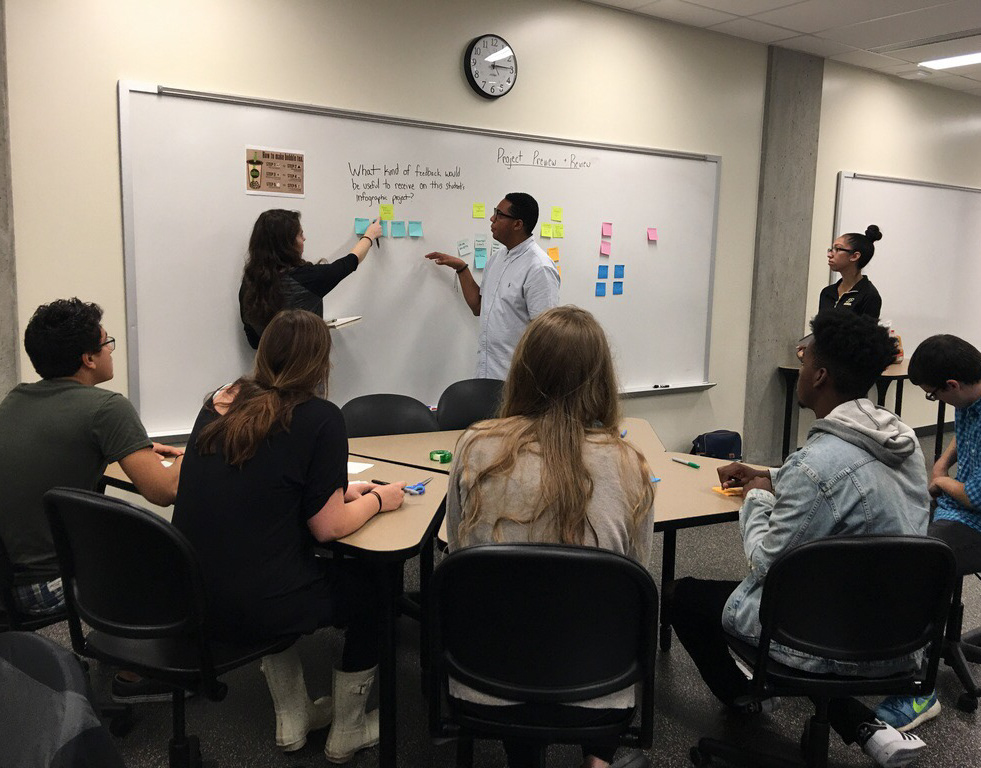My Contribution
• I wrote all of the interview questions and synthesized the results from 17 interviews
• I conducted secondary research on the topic
• I helped facilitate the affinity diagramming, persona creation, and journey mapping session
Project Overview
Cerner is interested in how college students interact with the health care system. College students tend to not make health a priority during their college career - why is this? Our team was asked by Cerner to conduct research on this problem to inform Cerner's UX Team.
Subject Matter Expert Interview
We started out the project by interviewing the Director of Purdue University's Health Center (PUSH).
Goals
• Learn what services PUSH offers
• Identify strengths and weaknesses of PUSH's current operations
• Understand how PUSH handles different situations
• Understand PUSH's perspective on student health care needs and challenges
Findings
• Communication with students is limiting and challenging
• PUSH offers many free or low cost services
• The primary services that students use are appointments with providers, chronic allergy management, and immunizations
• Appointments must be booked online, a common requirement that students often ignore
• College is the first time many students deal with their health on their own
From this interview, we found a clear correlation of problems: many students do not take advantage of health care services because they are not aware that these services exist, or are free/low-cost.
Survey
Next, we conducted a survey asking college students about their current health care habits. The survey received 168 responses from college students from various schools, but primarily from Purdue University.
Goals
• Understand common health care habits of college students
• Gain a better understanding of how many students utilize their on-campus health center.
• Learn about experiences students have had with their on-campus health center
Demographics
Findings
• Students claim that health is a top priority
• Going to the school health center is the last resort for students when they're sick. They'll do other preventive measures such as taking OTC medicine, rest, drinking fluids, calling their primary care provider, and other methods.
• Issues with the school health center prevent students from considering visiting or returning. These issues include insurance, scheduling, or receiving wrong diagnoses.
Student Interviews
As the survey was open, we also conducted interviews with 17 college students.
Goals
• Understand how students prioritize and take care of their health
• Hear stories and experiences about students' health care in college
Findings
• Majority of female students said health is a top priority and take actions to maintain their health. They claim they exercise and eat healthy regularly
• Students claim they get sick a few times a year often due to stress from academics
• A majority of students have visited the campus health care center at least once, but some have never been. Those who have been were for an illness, vaccination, or physical
• There were about an equal number of positive and negative experiences at the campus health care center. Those with negative experiences had issues with payment or were given an incorrect diagnoses
• There are many pain points that prevent students from going to the campus health care center when they’re sick. The main pain points are lack of knowledge of what their campus health care center does and what the process is, a lack of time in their schedule to make a visit, and hearing stories from friends giving a negative reputation
Key Insights with Quotes
• There is a false belief in how students prioritize their health. Student claim health is a top priority, but academics are often prioritized over health
"If I'm sick, and I have homework to do, I'll do the homework, despite being sick." - International student, 19
"I see the immediate effects of my academics, but I don't really see the immediate effects of taking bad care of my health." - Out-of-state student, 19
• Students' last resort when they're sick is to go to their campus health center.
"I really hate going to the doctor, so I try to put that off as much as possible." - Out-of-state student, 19
"I don't want to be that stupid person that goes to PUSH for something that's completely common." - Out-of-state student, 19
• Reputation and stigma play a major role in whether students go to their on-campus health centers
"I've heard that they [PUSH] generally will tell you either one of two things: either you're pregnant or dying...or give some weird diagnosis." - In-state student, 19
Secondary Research
We then looked at scholarly articles to see if there was any other research in this area on college student health and how it compared to our primary research.
Key Insights
• The college years (18-24) are some of the most crucial years to maintain your health and the things you do during those years will affect your health as you age. However, college students are not taking all of the necessary actions to maintain their health.
• College students deal with a great amount of stress. Stress in college students is one of the leading contributors to poor health and has serious consequences for both their physical and emotional health.
• Campus health programs need to focus on all different aspects of wellness to be effective towards students.
• Campus health programs need to reach out to the students who are not using their services and try to help them maintain a healthy lifestyle.
Analysis
Affinity Diagramming
After we closed the survey and conducted the interviews with students, we brought all of that data together utilizing affinity diagramming. This is a process used to show relationships between different sets of information. We were able to group the survey data along with the interview data into several thematic categories.
Goals
• Gather our large data set (student interviews and survey), and group similar patterns
• Help inform our persona creation





Themes
We discovered four major themes from our affinity diagram.
• Reputation - Students will avoid their on-campus health center due to receiving wrong diagnoses themselves or hearing about it from their peers
• Logistics - Due to logistical issues, such as finding time between classes to visit, many students just decide not to visit. Those who do tend not to return (unless they are managing a chronic condition)
• Extremes - Many students have misconceptions that their on-campus health center is for extreme cases only, not a free resource you can visit
• Communication - There is a disconnect in the communication of various services and students' perception
These four themes are what we emphasized to our sponsors at Cerner on being the key reasons as to why college students do not utilize their on-campus health centers.
Personas
Based on our interviews and the data we collected from our survey, we were able to identify issues which formed the base characteristics for our personas. We found common patterns in motivations and actions students take during affinity diagramming, and incorporated the different levels into our personas. We created these personas to better understand and empathize with students, as well as give our sponsors at Cerner an idea of what students' habits, motivations, and frustrations are like.
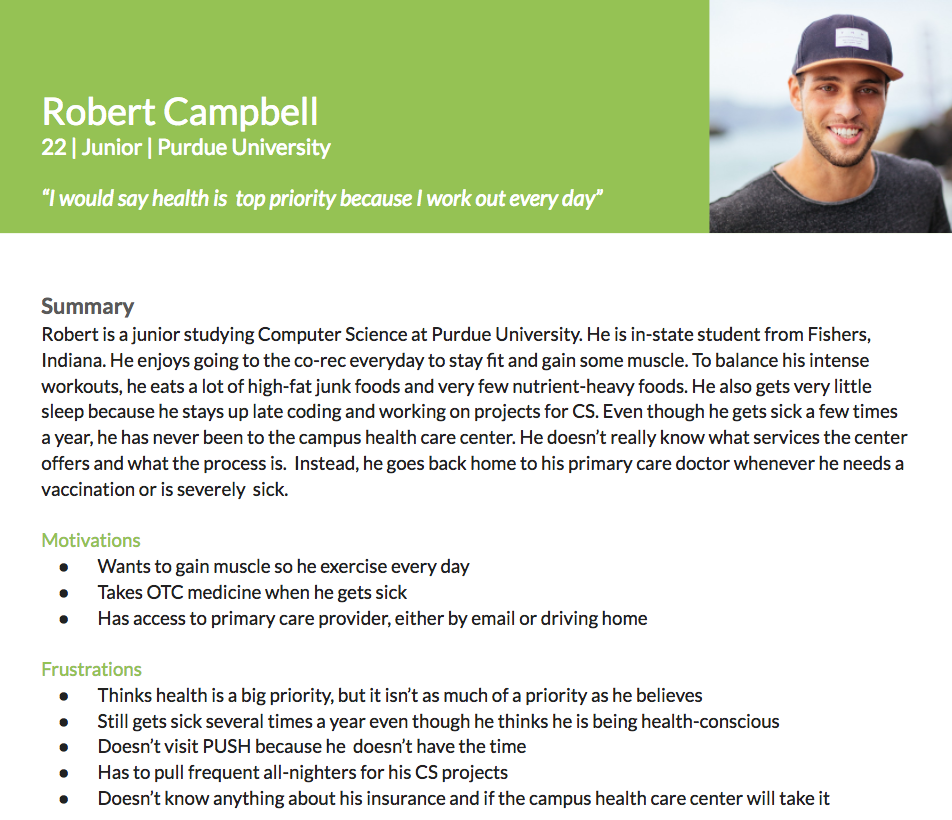
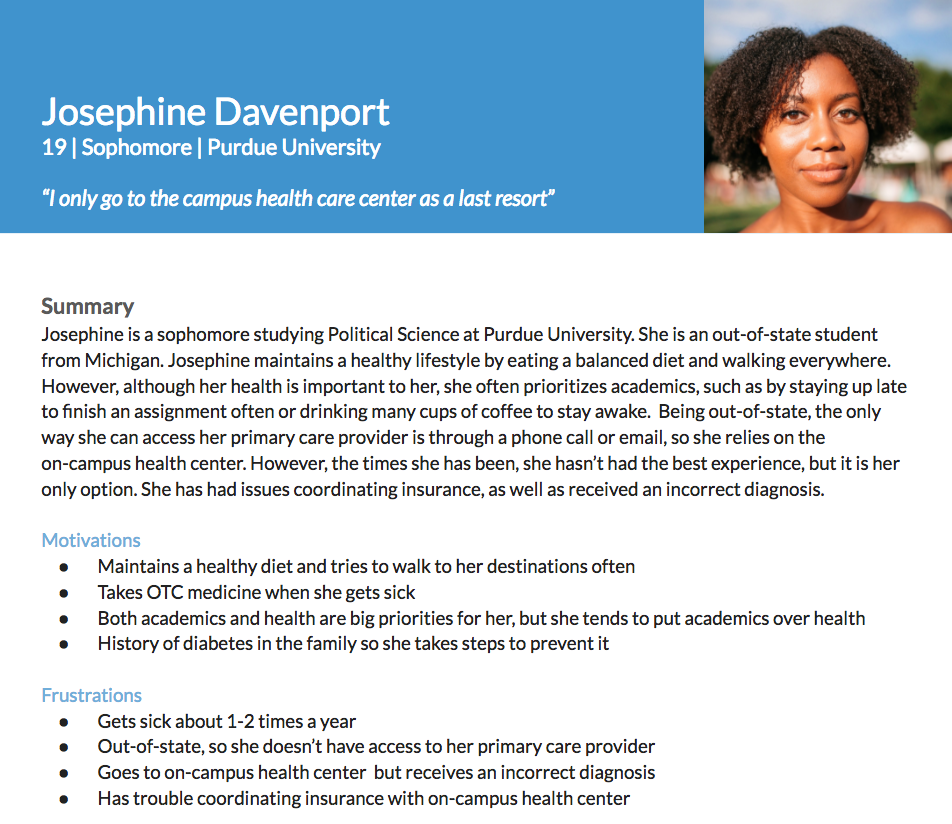
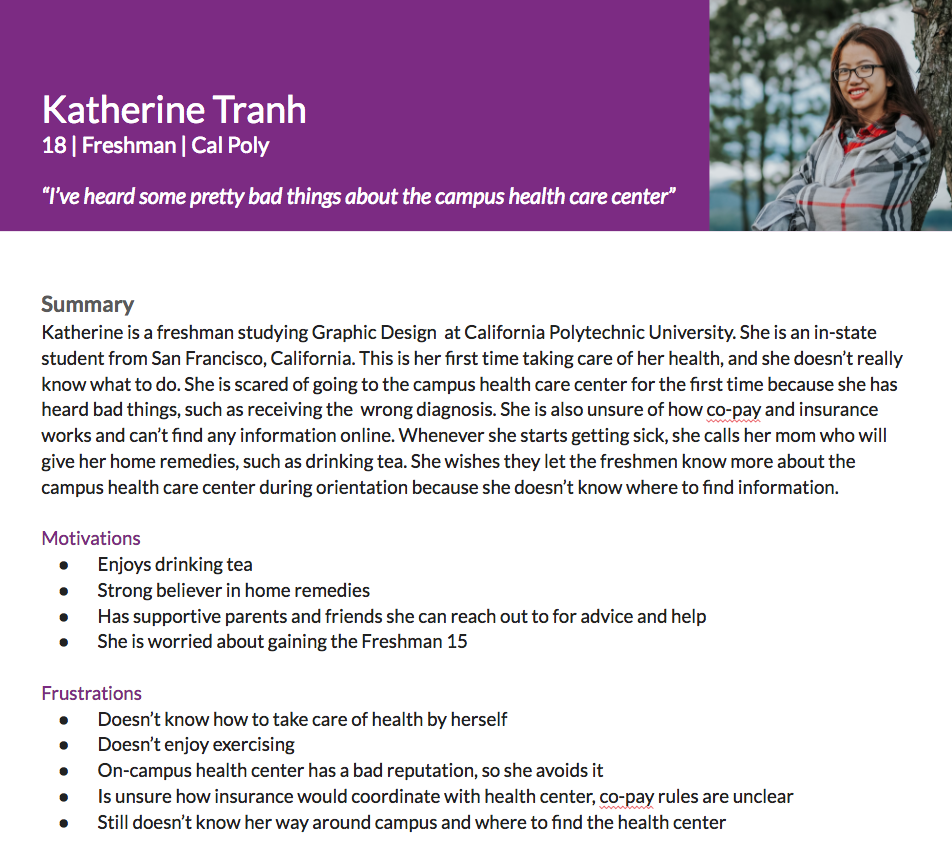
User Journey Mapping
Process
Using the themes, insights, and pain points we discovered from affinity diagramming, we began user journey mapping. We began by outlining the different general steps of the sickness process, from the lifestyle of the student to the actions they take along the way when they get sick to the eventual resolution of getting better.
To understand their emotional journey, we used each persona's motivations to plot points along the journey. We also began to develop a story for each persona. We made educated guesses on what they would do and how they would feel emotionally at each step in the map based on common patterns in actions or feelings of students from our primary research.
Goals
• Visualize the emotions our personas would feel throughout the journey of getting sick in college
• Develop a story for each persona around the process of getting sick in college
Conclusion
Based on all of our varying research, from interviews to a survey to secondary research, and our analysis of that research, we found that despite students' self-belief of giving high priority to their health, the on-campus health center was always their last resort when it came to monitoring and improving their health, preferring the advice of family and primary care providers instead. Many students are unaware of the services their on-campus health center provides and that they are relatively free or low-cost. This situation was not helped by the rather widespread bad reputation that on-campus health centers are incompetent and not worth the time and hassle.
If allotted more time for this project, I would look into more university on-campus health centers and their students' opinions and attitudes towards their school's center. I would also look more into the problem of why students are unaware of their health center's services and why there is such a bad reputation for some centers.
